Wondering whether your kitty falls under the ideal weight category or suffering from overweight or underweight issues?
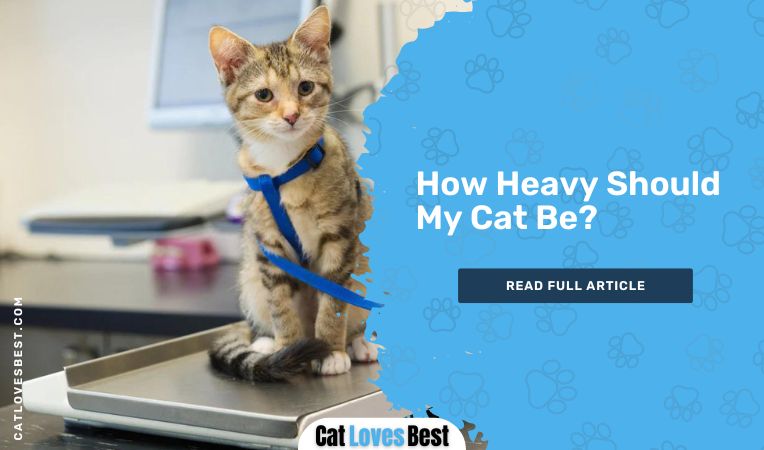
The majority of pet parents have the same concern and they don’t get the answer so easily.
To solve your problem, we have come up with a blog containing all the information related to your kitty’s weight. Plus, also highlighted the features and health issues to look at, which can give you a hint whether she is healthy or below the line.
Prevention tips are also highlighted to overcome the issue.
Categories Break-Down of Your Cat’s Weight!
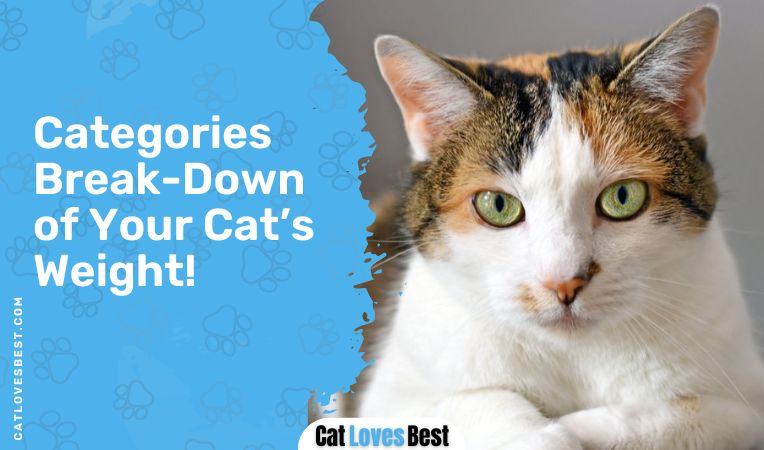
After doing research we have come up with an ample amount of information, and break down the weight categories in the following ways.
As you will keep on reading, you will get the idea your kitty will fall under which category, and how you have to deal with it.
Keep reading to know the category in detail.
Critically Underweight
It’s very rare to observe any cats fall under the critically underweight category. It requires the immediate attention of the vet to bring her back to a healthy lifestyle. You will easily be able to see the bones and ribs even from the side and above, their energy level will be low and stopped grooming themselves, etc.
It is observed that normally pet felines will not encounter such a situation, it will be seen in strayed cats, lost one who doesn’t get their meal care, etc.
If you notice any felines underweight, it is suggested to seek the vet’s help, and on an immediate basis take her for regular check-ups. If necessary, keep her in the clinic to bring back the lost diet, and prevent her from a severe underlying health issue.
Underweight
Well, yes underweight is also an issue in cats that needs to be checked and treated on time. This is because if your kitty is not eating properly and skipping meals. It leads to weakness in her body, which affects their immune system and gives a signal to diseases to enter her body.
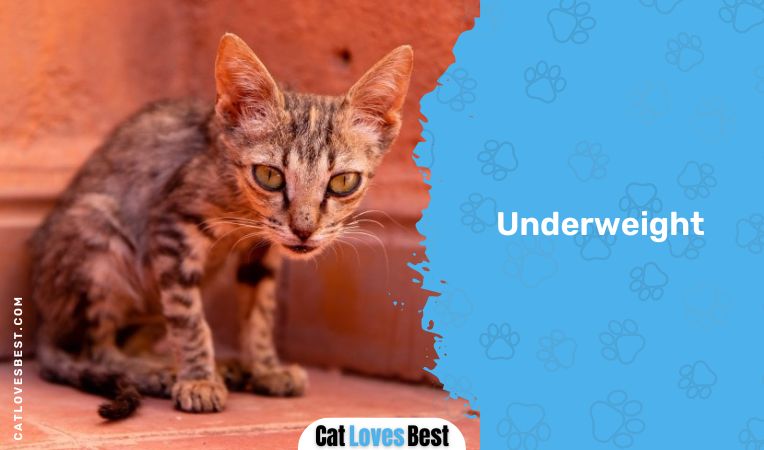
Underweight cats will have fat and you will be able to touch their bones and ribs but it might be difficult to see them with naked eyes.
It is advisable to seek a vet’s help and plan her diet accordingly to regain her weight. Sometimes, it is also observed that cats lose weight because of underlying health issues. So a full body check-up is also mandatory. It will help the vet to plan her new diet plan accordingly.
Once you know the reason behind her losing weight, offer her meal as per her body requirement. And when she starts adapting to the routine make her comfortable with planning a full diet plan, and help her in regaining weight.
Ideal Weight
Experts states, “The ideal weight for the average healthy cat is 10 pounds.“
If your kitty falls under the ideal weight category, you will be able to notice the ribs, bones, and stomach line easily, and only one layer of fat will be there, which is normal.
The tail’s bones will also have a fat layer but it will be visible, her fur will have shiny look, and other healthy features of her body will be highlighted.
Plus, your kitty will take her meal on time, will not demand treats, participate in more physical activities, etc. It has been observed that felines fall under the ideal weight category don’t have to face any severe health issues and stay happy and live a longer life.
It’s also true that it requires very strict monitoring of pet parents to keep their kitty healthy and maintain her weight by giving a healthy diet with no excessive carbs, fat, etc.
Overweight
NIH states, “Overweight and obesity are among the most important health problems in domestic cats. These conditions can be related to several diseases in cats and can influence their general welfare.”[1]
As you know the average weight for a cat is 10 pounds so if she weighs around 10-20% more than the ideal one it is considered to be overweight, which needs to be monitored on time to prevent her from health issues.
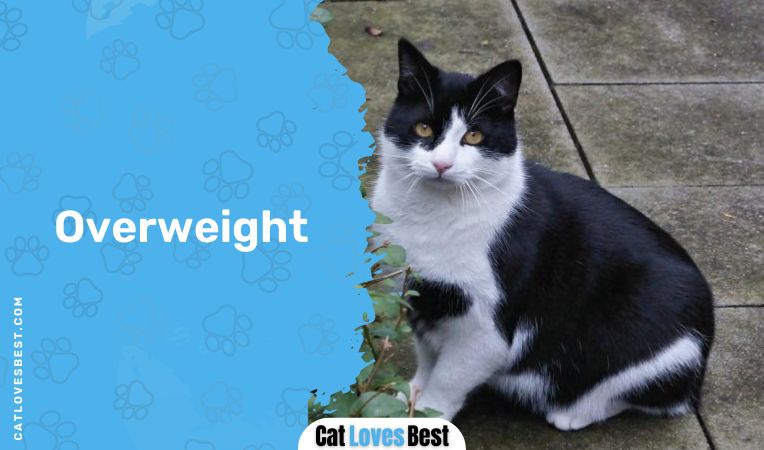
Apart from weighing and checking if she has excess fat, another way is to touch and try to feel her stomach, ribs, and bones. If you are not able to feel it easily and require a little bit of pressing it means she has gained excess fat.
If your kitty falls under the overweight category, it is suggested to take her for a check-up and start feeding her only healthy, and avoid carbs or fat ingredients. If it is not treated on time it will lead to severe health issues for your kitty which is not good.
Excess Overweight
PetMD states, “A cat is considered overweight when it weighs 10-20% more than its ideal body weight, and obese when excess fat is more than 20% above its ideal body weight. Feline obesity is a very common disease, occurring in up to 63% of cats in developed countries.“
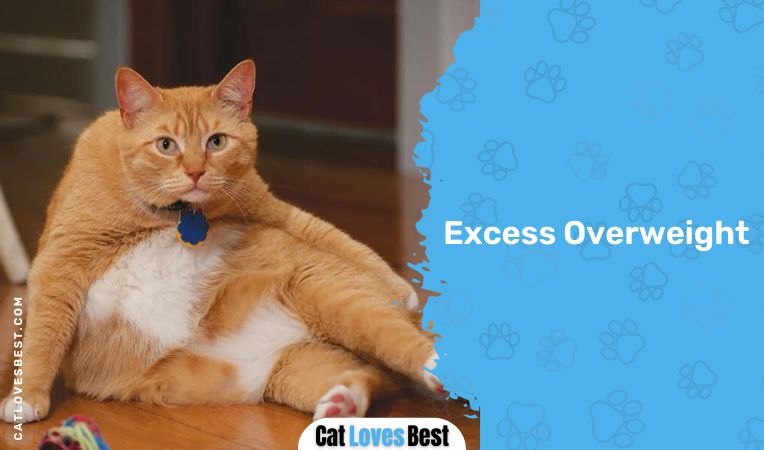
Felines falling under this category has to go through many health issues like diabetes, kidney issue, irregular heart functioning issue, thyroid, liver shattering, and other related severe health issues.
So, it’s important to take good care of them and start monitoring their health on time to prevent chronic underlying health issues. Being excess overweight affects your kitty’s immune system, which leads to digestion problems. They start snoring because excess fat doesn’t allow their liver to expand fully for breathing.
Here, are a few symptoms of obesity in cats
- Loss of waistline
- Difficulty in doing physical activities like running or climbing
- Her bones and ribs cannot be felt easily due to excess fat
- Irregular toiletry routine
All these are warning signals that your kitty needs to visit the vet clinic. So, it is suggested to consult the vet and follow their guidance. Plus, switch her eating habits to bring her back to her ideal weight, and prevent your cat from severe underlying health issues, which can threaten her life.
Tips to Overcome the Overweight Issue
As you know, in the above paragraphs we have discussed different categories to give you an idea of the cat weight chart. If your kitty falls under the overweight category you know very well that she needs to reduce her weight to avoid health issues.
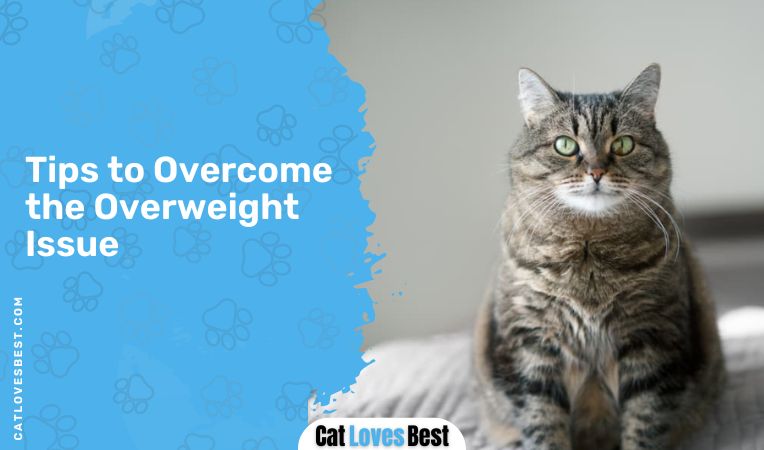
The vet suggests prevent your feline pal from gaining weight unnecessarily. This is because extra fat leads to fatty liver issues in cats, which further creates severe health problems for them.
In fact, if fatty liver issues are not cured on time it affects your kitty’s blood functioning, which further might create a life-threatening issue for her.
Here, we have some beneficial tips for your kitty, which will help her to stay healthy.
- Firstly, switch her diet, and consult the vet for healthy diet plans.
- Feed her more animal protein, and avoid fillers like grain, soy, and wheat, which can add extra fat to her body.
- Try feeding her in small meals, like dividing the whole quantity into four small meals. This will help you to prevent her from eating treats, and make her tummy full.
- Feed your kitty both dry as well as wet food, or you can also serve her a combo of both food.
Apart from monitoring her feeding habits, it is also important to keep her active, so that her body doesn’t feel more lethargic after having a meal.
It is advisable to spare some time for your kitty’s physical routine also, take her for a walk, play with her, try doing adventurous activities, etc.
All these will help to keep her body active and her digestive system will work effectively.
Tips to Overcome the Underweight Issue
Taking care of your kitty’s weight is important, and to see whether they are living a healthy lifestyle.[2] Now you are pretty well aware of the ideal weight of your feline pal, and if she is below that bottom line you need to check on her.
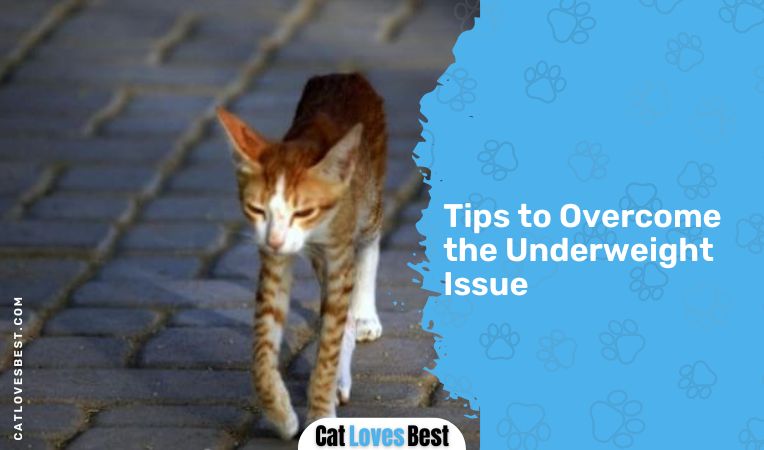
We have some tips for you, which will guide you in a better way, and help you to regain your kitty’s weight and give her a healthy lifestyle.
- If your kitty is underweight, one thing you need to do first is to check her diet plan and switch the quantity of the food.
- Check out the ingredients you are feeding her, and consult the vet for a healthy diet plan.
- Make sure you are adding animal-based products to her meal because animal protein is important for her health. Along with protein, carbs and healthy fat should also be added to her food for a balanced healthy diet meal.
- To regain your kitty’s weight, you can free-feed her or can also opt for multiple servings. But, make sure the quantity should be divided in such a way that you do not overfeed your feline pal.
After switching her diet plans, and offering a nutrition-rich meal, still she is not gaining weight. In such cases, it is advisable to take your kitty for a full body check-up. It is possible that she might be suffering from any underlying health issue, which you were not able to identify.
FAQs
How you can tell if a cat is overweight?
By observing your kitty’s body structure, and measuring her weight you can easily find out that she is gaining weight. The feline stomach should be visible not ribs and easily felt while touching her body. But if you notice layers of fat, it’s a sign that she is putting on weights and need to be controlled on time.
How heavy is too heavy for a cat?
As per body weight, cats are overweight, when their body weight is more than the average weight required for felines. Plus, by observing your kitty’s body structure also you can identify she is overweight when only fat can be seen, and no bones.
Do cats fart?
Yes, Like other animals, cats do fart if their gastrointestinal functions well. Or else when their stomach doesn’t function well and faces bloating issues, in such a scenario, she is not able to pass gas.
Well, It’s a Wrap!
Confidently, we were able to serve you the appropriate content related to the cat’s weight.
We have categorized it into five categories and also highlighted the main factors to look at, which will give you an idea of whether your kitty is within the bottom line or above.
So, now you know enough about your kitty’s weight and also tips on how to bring her back to the normal one. Plus, we have given tips related to being overweight and underweight also.
Most pet parents face these weight issues, if you are one of them you know how to deal with it and when to take her to the vet for immediate treatment.
References:
- Wall, M., Cave, N. J., & Vallee, E. (2019). Owner and cat-related risk factors for feline overweight or obesity. Frontiers in veterinary science, 266.
- Russell, K., Sabin, R., Holt, S., Bradley, R., & Harper, E. J. (2000). Influence of feeding regimen on body condition in the cat. Journal of Small Animal Practice, 41(1), 12-18.

